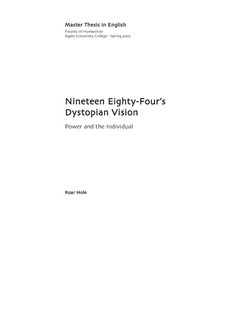| dc.description.abstract | Orwell’s Nineteen Eighty-Four is by many known for, and consequently discussed in terms
of, its “predictions” of the future, and its political satire. This thesis does not aim at discussing
Orwell’s political ambitions, nor the alleged “prophecy” of the novel. Rather, this thesis
focuses on and discusses the dystopian nightmare of Nineteen Eighty-Four, which is
characterised by totalitarianism and its power discourse. The novel’s society is emphasised by
O’Brien’s statement of “the boot stamping on a human face.” I have used Foucault’s theory
on Pastoral power to explain the power discourse of the Party. Furthermore, I have explained
the society of Nineteen Eighty-Four by Lois Althusser’s concepts of Ideological State
Apparatuses and Repressive State Apparatuses. Goldstein’s Book serves as a handbook for
describing and unveiling the blunt mysteries of the novel, and in this thesis works in tandem
with Foucault and Althusser to disclose the dystopian qualities of the novel. A major
characteristic of Nineteen Eighty-Four is the Telescreen and the omnipresent surveillance,
which is similar to Jeremy Bentham’s Panopticon as discussed in Foucault’s Birth of the
Prison. In this context, I have discussed Nineteen Eighty-Four as a Panoptic society, a society
which functions as a disciplinary institution that gathers knowledge, which works reciprocally
with power. The Panopticon, totalitarianism and the power discourse of the Party have great
effects on the individual. The final aspect of this thesis consequently focuses on the Party’s
negation of the individual, and Winston’s struggle to liberate himself and sustain his
autonomy in a society devoid of human contact, and where the great masses of individuals are
mere automatons shaped by the Party to serve the demise of humanity. In this horrific image
of a loss of autonomy, an all-pervading surveillance, and the abuse of power, the warnings
Orwell asserted in Nineteen Eighty-Four are growing increasingly nearer as we are entering a
world characterised by its escalating discourse of technology, where individuals are alienated
from each other by the use of media and an ever-increasing surveilled world after 9/11 | |
